Demand destruction on an epic scale, after the price explosion. And inventories are piling up.
By Wolf Richter for WOLF STREET.
It boils down to this: In terms of condos, sales that closed in May fell further and hit the lowest point in the data, along with Lockdown May 2020, seasonally adjusted; supply spiked to the highest level since the Housing Bust.
In terms of single-family homes, sales inched up, but barely, and remained at historic lows, and below May 1995, seasonally adjusted; supply spiked to the highest level since 2016, according to data from the National Association of Realtors today.
A Condo Bust is unfolding.
Condo sales, which have been careening lower all year, dropped further in May to a seasonally adjusted annual rate of 360,000 condos, the lowest in the data going back through 2012, along with Lockdown May 2020. Sales were down by 38% from May 2019 and by over 50% from May 2021. Demand destruction on an epic scale, a result of prices having exploded in recent years far beyond what the market can bear (historical data from YCharts):
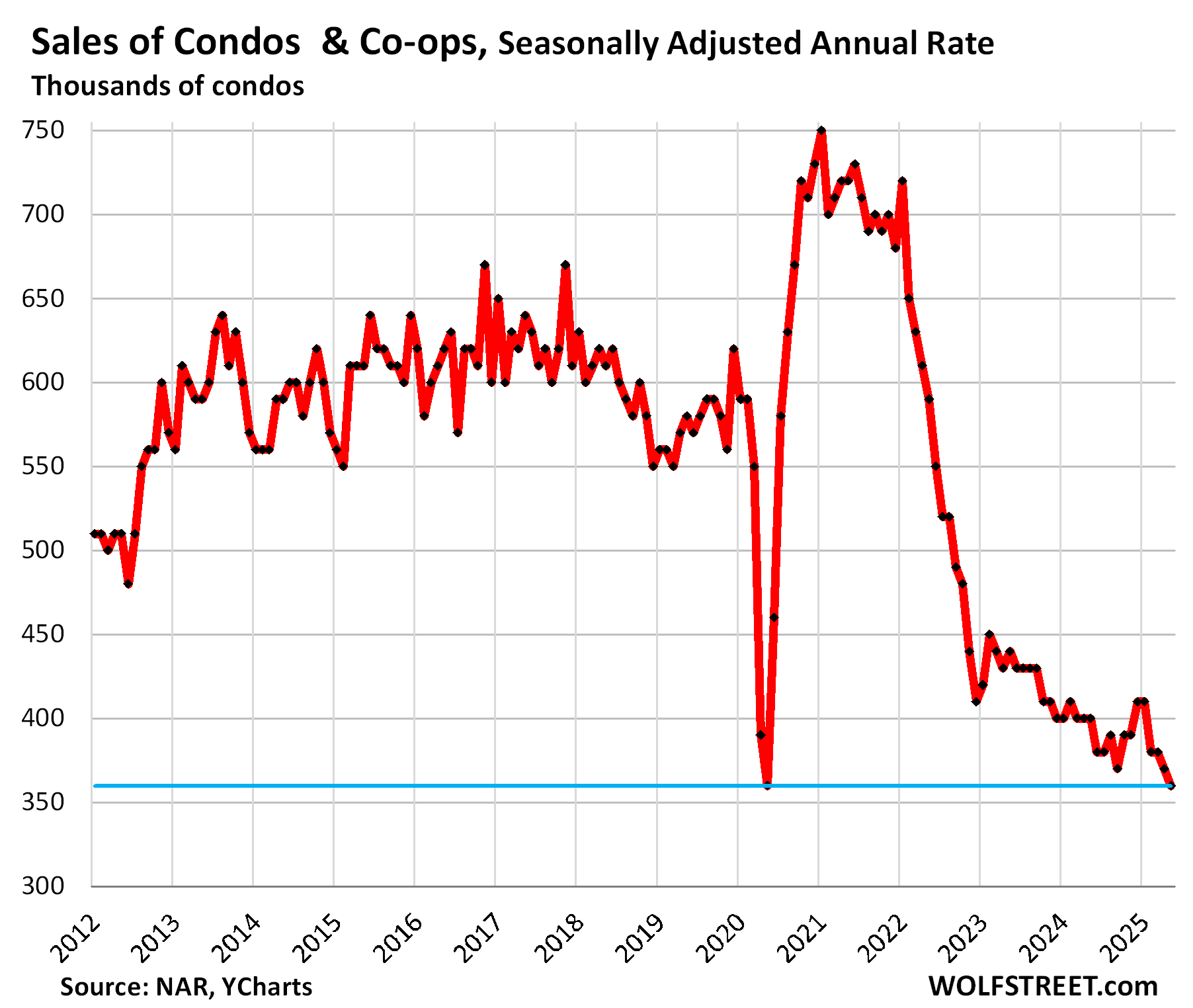
Supply of condos spiked to 6.7 months in May, the highest supply since the Housing Bust in July 2012 (historical data from YCharts):
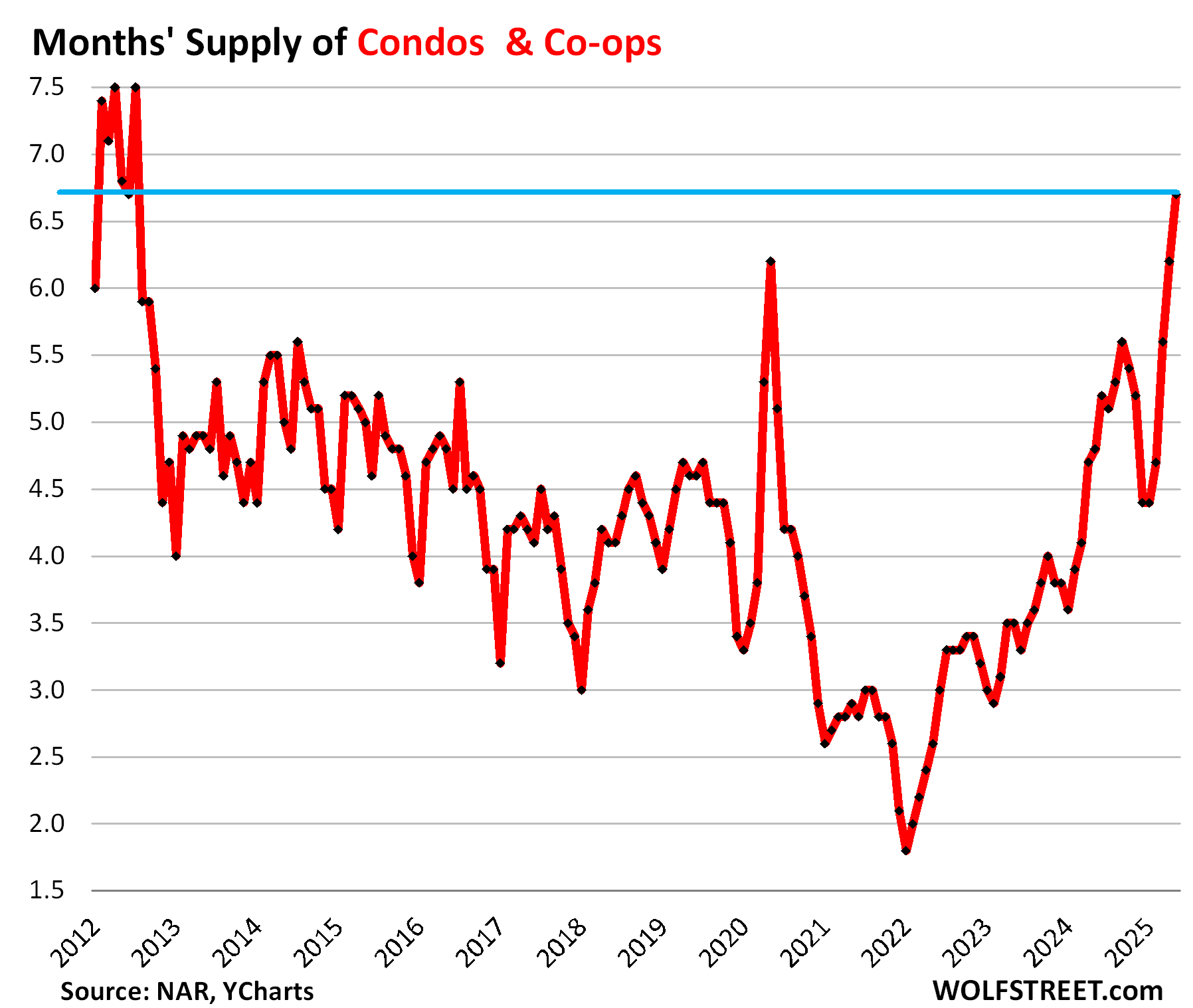
Single-family home sales still below 1995, supply spikes.
Sales of single-family homes, which have been hobbling along the lowest levels since 1995, inched up a hair in May to a seasonally adjusted annual rate of 3.67 million homes, roughly flat with May 2024 – with 2024 having been the worst year since 1995. Sales were down by 23% from May 2019, down by 29% from May 2022, and down by 9% from May 1995 (historical data from YCharts):
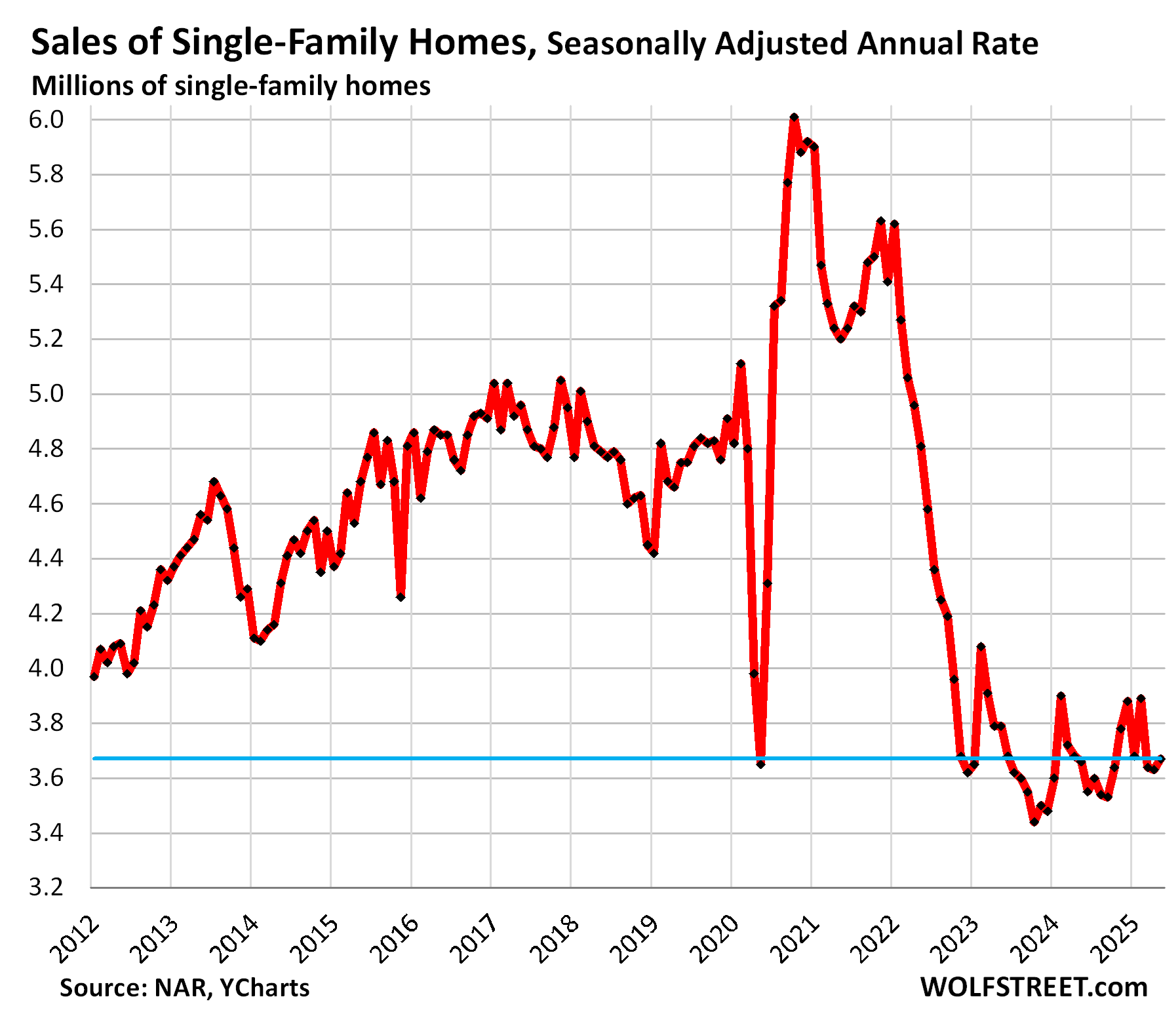
Supply of single-family homes spiked to 4.6 months, the highest supply since July 2016:
When sales began plunging in 2022, the theory by the real estate promoters was that sales were plunging because there was a housing shortage and there was nothing to buy. But sales continued to plunge even as inventories rose, and now inventory is piling up and sales remain at collapsed levels, and the real reason is that prices have exploded beyond what the market can bear, and so demand has plunged because prices are way too high (historical data from YCharts).
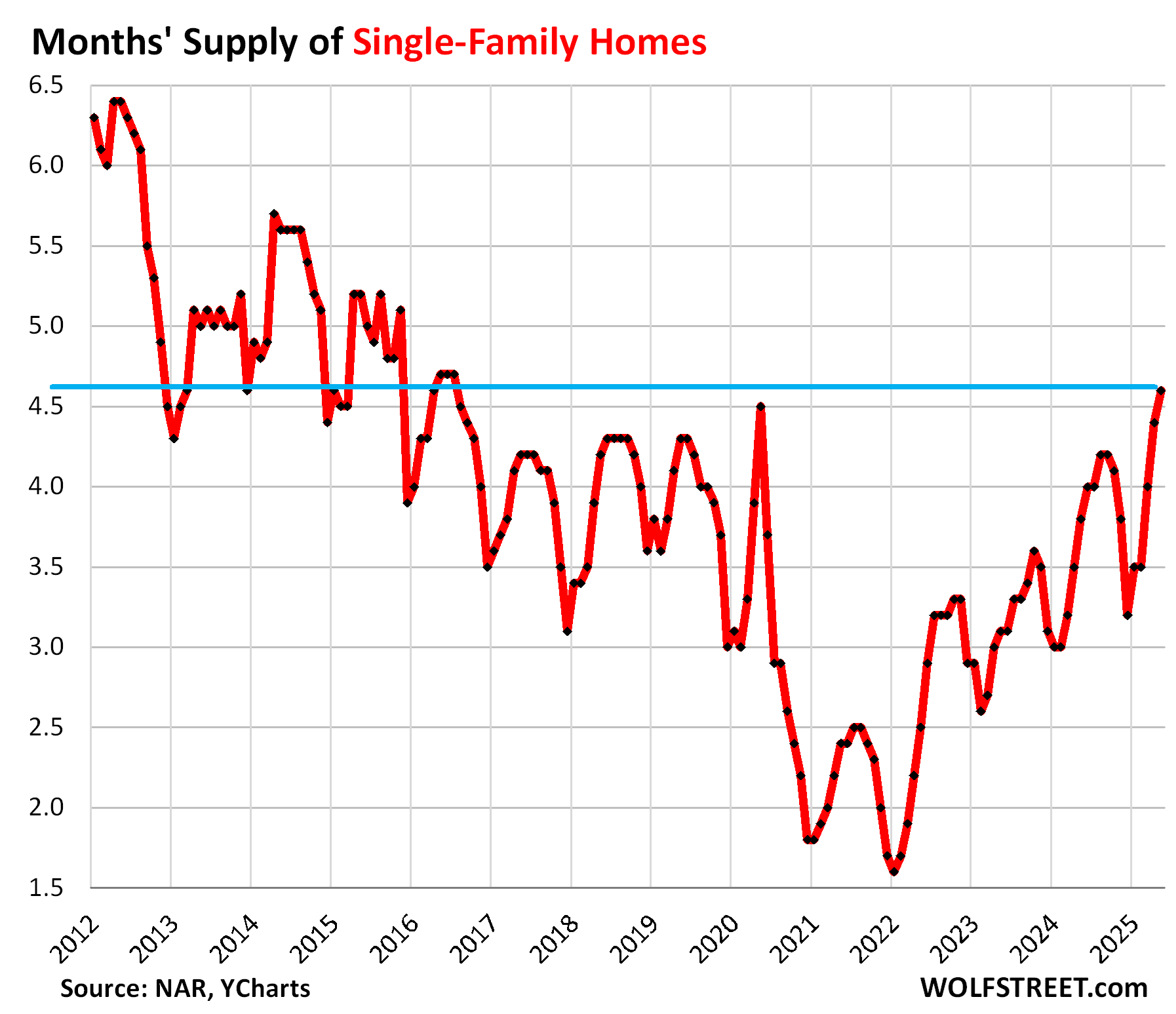
Median price for condos and single-family homes.
The median price can be heavily skewed by changes in the mix of homes that sold. In the spring, nationally, a larger number of higher-end homes come on the market and sell, which changes the mix of what sold and shifts the national median price higher. It does the reverse in the fall and winter. This contributes to the seasonal ups and downs of the national median price. Nearly every year, the national median price peaks in June and then declines through January or February (the exception was 2020).
But the seasonal increases in May and in recent months have been weaker than in prior years, and the year-over-year gains have been melting away.
The median price of condos inched up just 0.3% to $371,300 in May from April, according to the National Association of Realtors today. That tiny uptick was far smaller than typical in May.
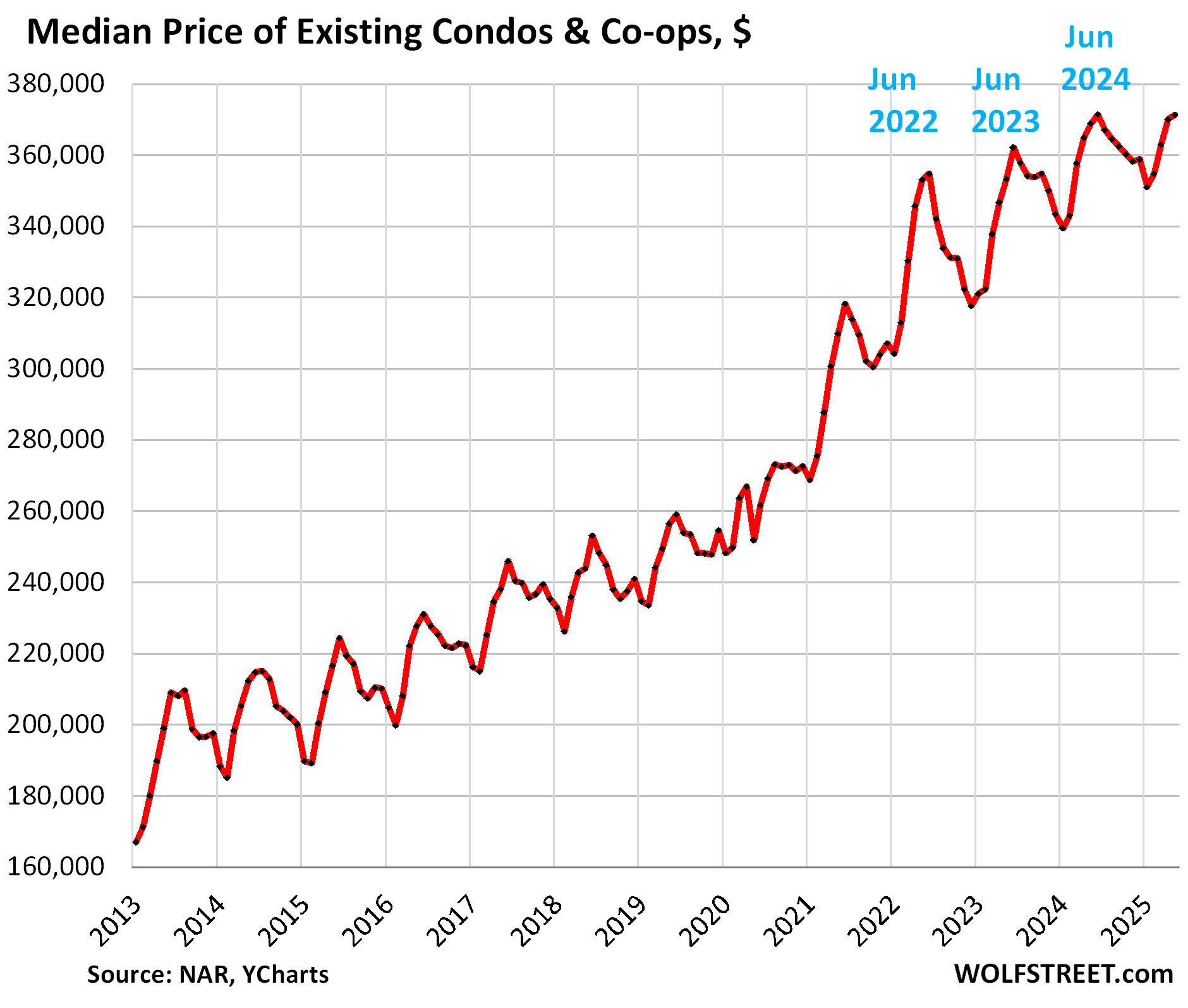
This measure of the national median price of condos has spiked by nearly 50% in five years, driven by the Fed’s interest-rate repression and FOMO.
In many cities, condo prices spiked by 60%, 70%, even 80% over those five years. Now prices are simply way too high and don’t make economic sense anymore.
So in many cities, condo prices peaked in 2022 or 2023 and then started careening lower. Here are 20 bigger cities where condo prices have dropped by 10% to 23% from their peaks, unraveling the most epic condo bubble ever. Other cities are following with a lag. Some have just recently turned the corner.
For example, Oakland: Condo prices have returned to where they’d been in April 2016. That was 9 years ago. The pace of the price drops accelerated, with a month-to-month drop of 1.7% in May, seasonally adjusted, according to the Zillow Home Value Index.
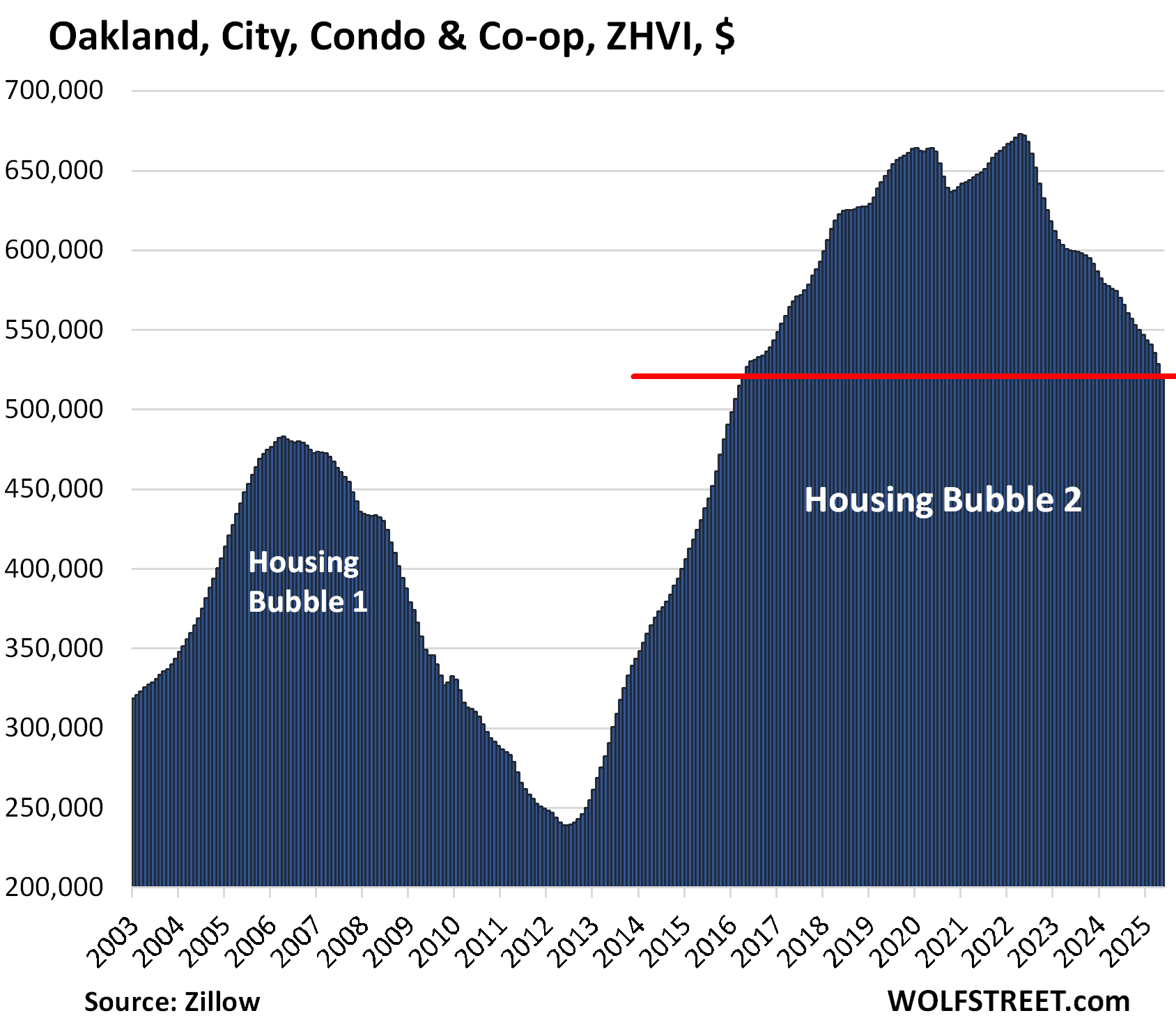
The year-over-year percentage gain of the national median price of condos was whittled down to just 0.7% in May, from +1.4% in April, and from the range of +10% to +23% during the price explosion in 2021 and 2022.
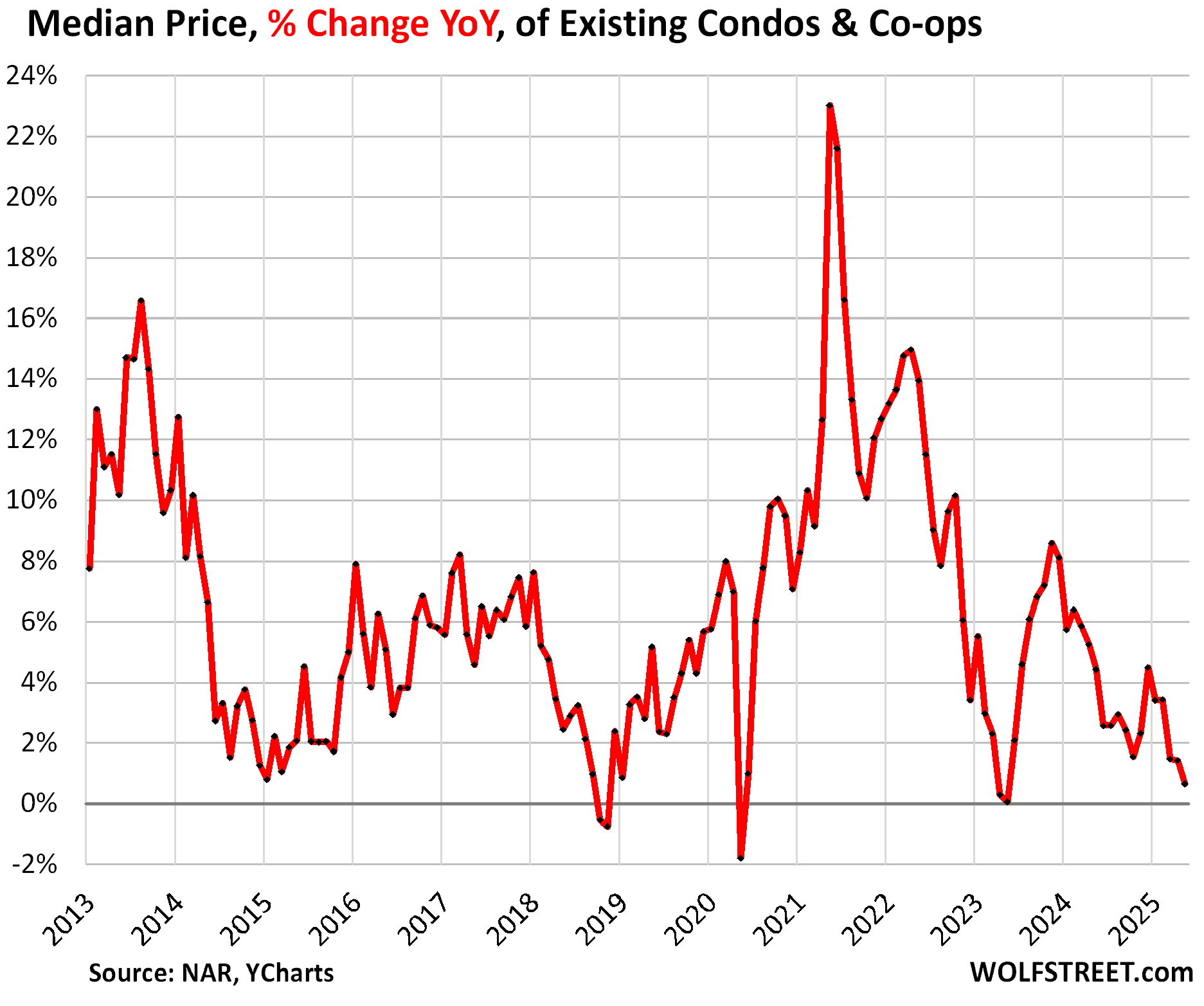
The median price of single-family homes rose to $427,800 in May, whittling the year-over-year gain down further to just 1.3%, the fifth month in a row of narrowing year-over-year gains (from +5.9% in December).
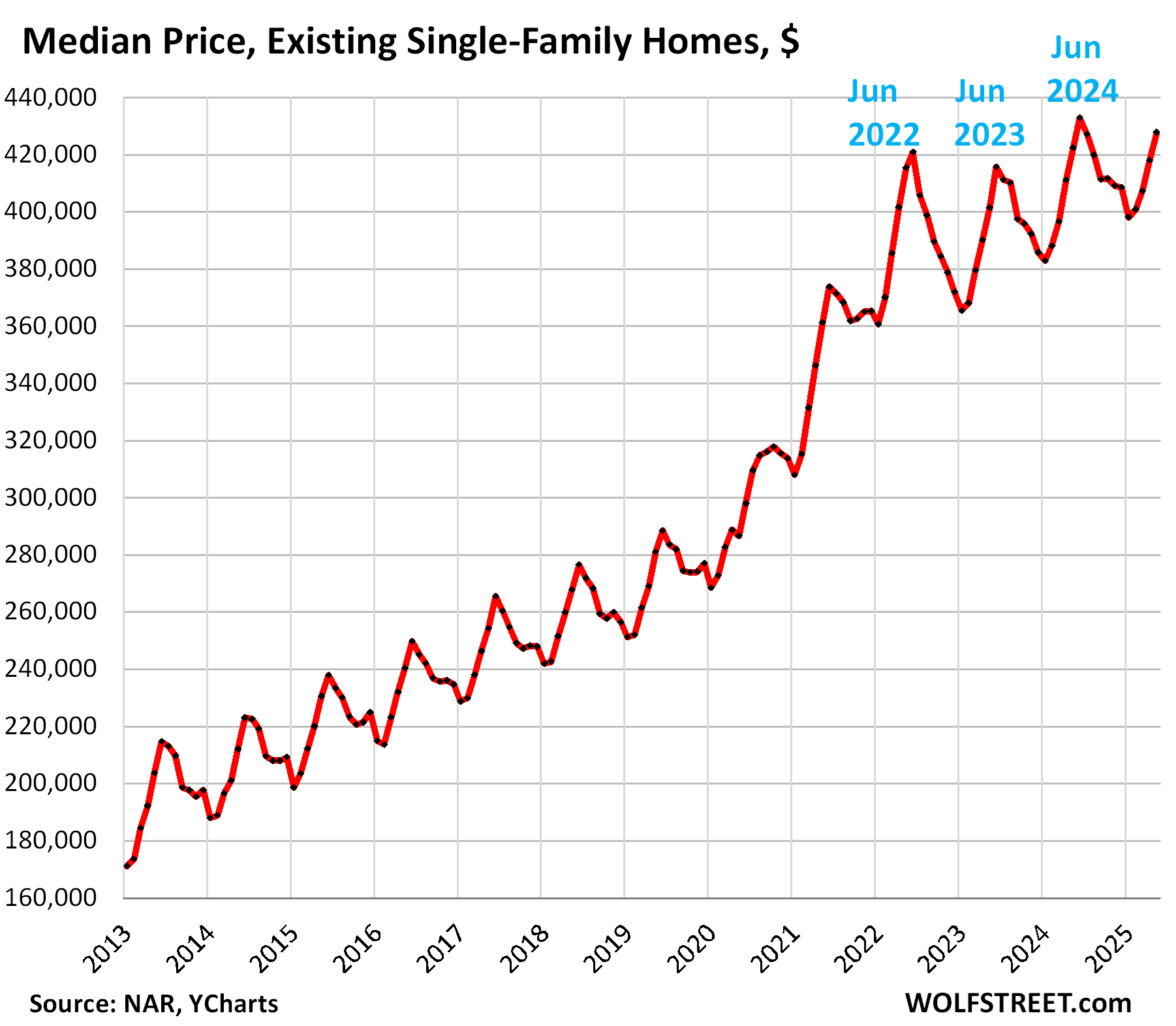
This measure of the national median price had exploded by 50% in the three years between June 2019 and June 2022, on top of the large price gains in the prior 10 years.
But lots of markets have turned. In 10 big cities, prices have declined by 8% to 22% from their peaks: Austin, Oakland, New Orleans, San Francisco, Washington D.C., Denver, Portland, Phoenix, Fort Worth, and San Antonio. Other big cities also experienced price declines but aren’t at 8% yet. Some smaller cities, such as Birmingham, have double digit price declines. So here are the 10 Big Cities with the Biggest Price Declines of Single-Family Homes. For example Austin:
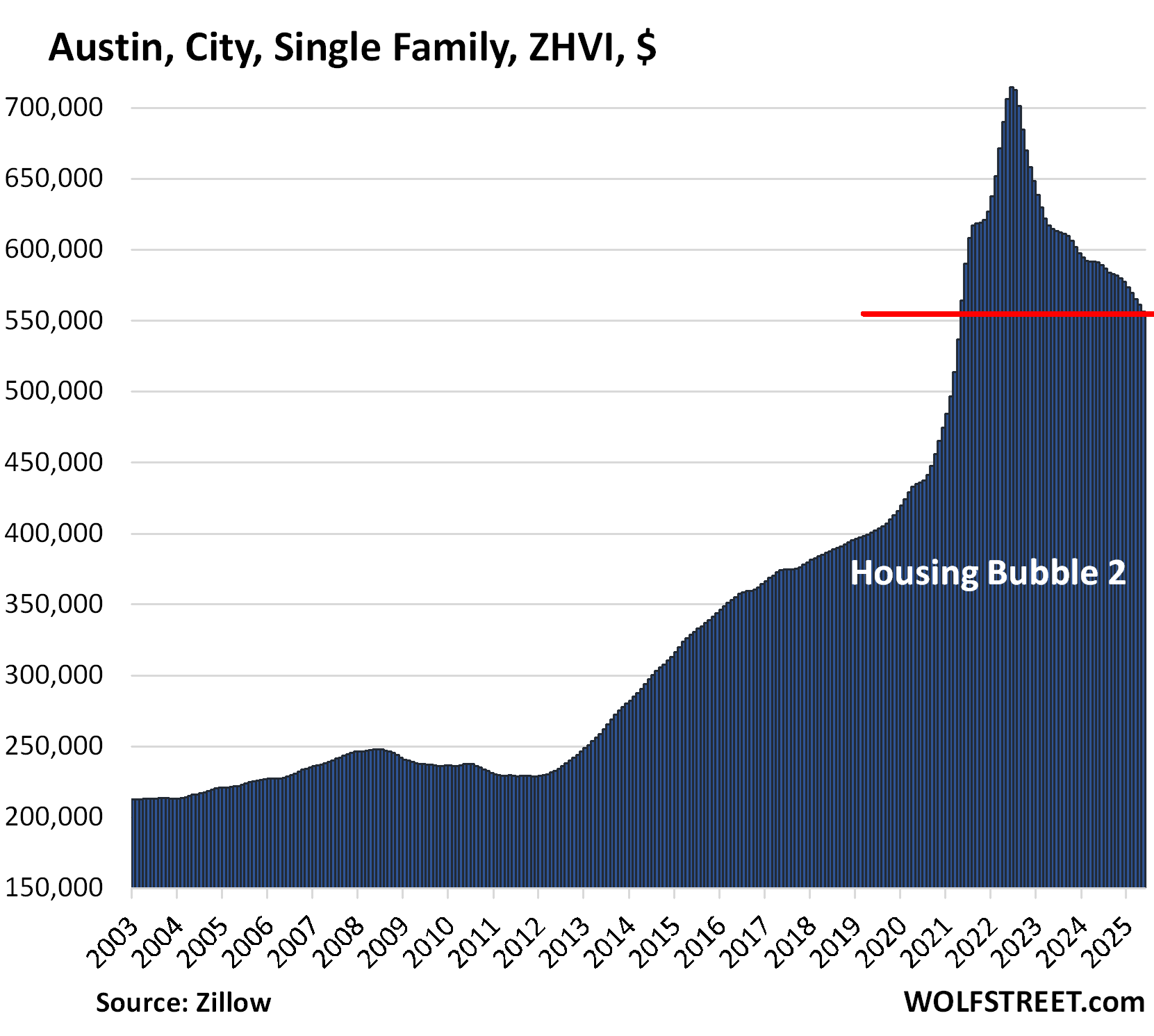
Year-over-year, the national median price of single-family homes was up only 1.3% in May, the smallest gain since July 2023 when the national median price emerged from a period of year-over-year declines.
During the price explosion, the year-over-year increase peaked at 26% in mid-2021, which was completely nuts, and those too-high prices then triggered the epic demand destruction we’re now seeing. The market solution to this type of demand destruction is lower prices.
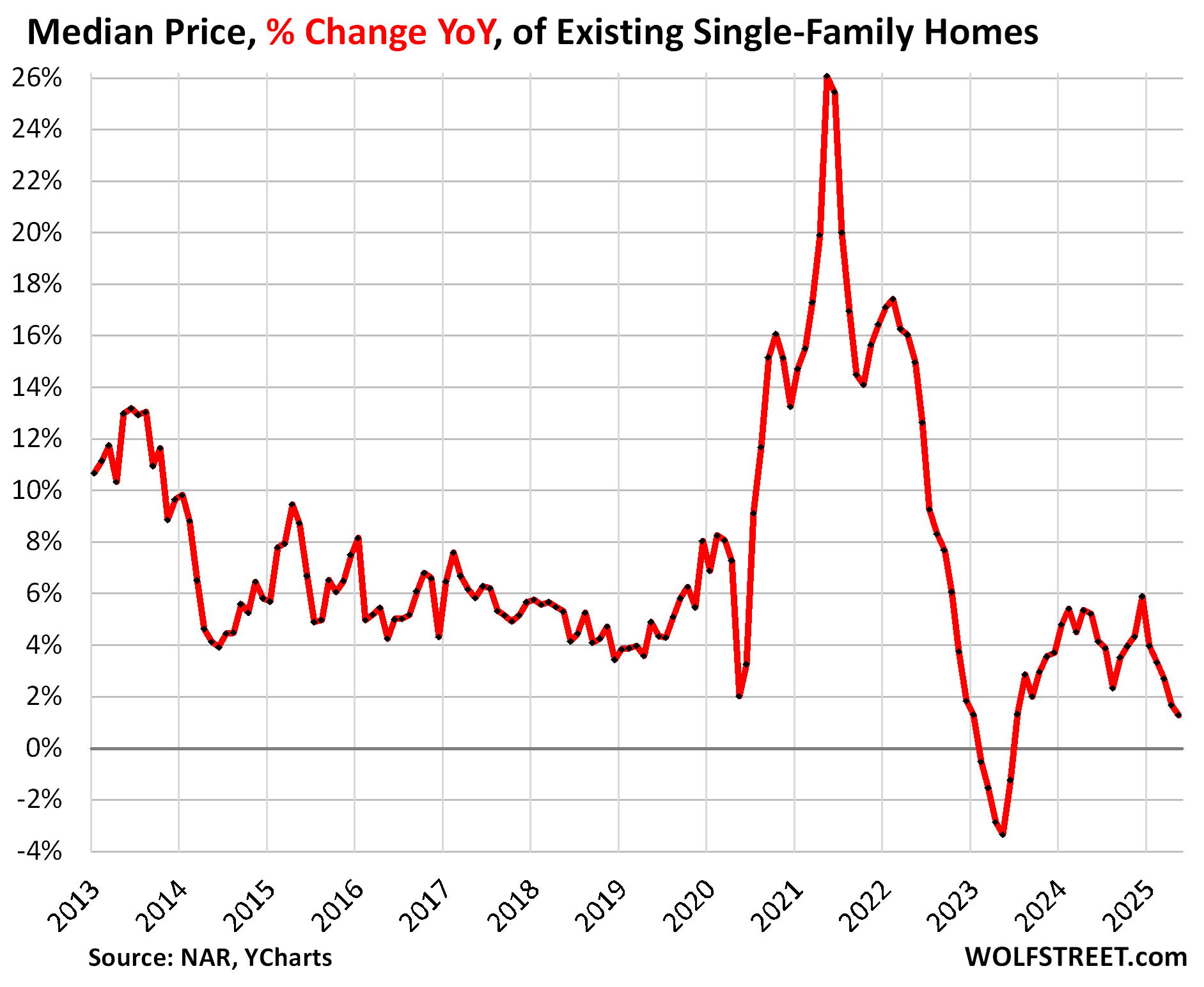
Enjoy reading WOLF STREET and want to support it? You can donate. I appreciate it immensely. Click on the mug to find out how:
![]()


Where I live in an affluent area of Florida, homes are still selling and getting good prices; not as high as before, but still too high considering incomes. It is taking longer for the sale, but still selling at very high prices.
Condos, are not selling to well, though sellers are not lowering their prices much. So no liquidity for the seller, or no availability for the buyer…they must be too far apart. In previous situations like this, the sellers just waited it out for the market to return, i.e. a few years or a little longer.
No one said there were zero sales. Sure there are some sales, and obviously some homes are still selling, or else there would be no transaction prices. But sales are way down.
This “good price” you speak of is a lower price than a year ago and two years ago, but still too high for sales to return to normal.
Seems you’re in Naples (IP address), so you’re looking at this scenario:
Single-family: -6.7% YoY, -6.9% from peak in April 2024, -0.7% MoM, prices back to April 2022
Condo: -9.9% YoY, -12.0% from peak, -0.9% MoM, prices back to April 2022.
Encouraging to see for sure, although wishing this is also spreading fast in SoCal as well but maybe in due time.
Wonder how this big adjustment down is having an affect on condos/houses removed from listing entirely. Saw a headline today stating houses for sale being removed from listing (withou being sold) is at the highest for a long time. Looks like there are still plenty of sellers thinking if they come back later they can get top dollar. This might also be true based on my very anecdote evidence, been getting way less of the Refin for sale emails like I experienced just a month or two ago, so either houses/condos are still selling or there are a lot of pulling off the market until better days..
Or how about this hopeful strategy? “Let’s just rent it out until the market improves.”
Of course, we at Wolf Street know that hope is not a strategy.
Condos will be rented out, rather than sold. They are smaller units and are located in prime working areas. Prices for these homes reflect single family homes, bizarre for something that used to be an entry for housing. If there are to be a correction in housing, it will be these. Less amenities and a smaller foot print. I see these go for a mortgage payment in my area for rent.
“Condos will be rented out, rather than sold.”
1. Look at the #2 chart. What does the huge spike in supply tell you, highest supply since 2012??? Those condos are coming on the market, that’s what it is telling you. Owners ARE trying to sell them.
2. If you purchased in recent years, your cash flow from rent, if you can even rent it, will be far lower than your cash expenses (mortgage payments, HOA, property taxes), not including special assessments. So every month, that condo is sucking cash out of your account and is losing value on top of it. It takes nerves of steel and a fat account full of disposable cash to sit this out.
We could see an uncle point and a big, sudden, collapse down.
Multifamily is a terrible way to live, if I get pinched, I’ll get a roommate in the spare bedroom and bath…Florida condos got some relief this year but if it’s 30 years old you got major reserve requirements forthcoming and their are 900,000 units 3 stories high or 30 plus years old…stay in your single family
Getting a roommate is the last thing I would hope to have happen. Never had a good one ! Goodness, maybe it’s me.
Ownership is expensive but so far, worth it. Just not at these prices.
Always enjoy your analysis
@Phoneix_Ikki wrote: “Saw a headline today stating houses for sale being removed from listing (without being sold) is at the highest for a long time.”
In 1995-98 and 2009-12 many homes and condos came on and off the market folloing this pattern.
1st time What they paid + Real estate commission + Profit
2nd time What they paid + Real estate comission
3rd time What they paid
4th time What they own the bank + Real estate comission
Most people that don’t have to buy are better off waiting (since most people that don’t “need” to sell are waiting) but for anyone making a move that wants to buy (or married to someone that wants to buy that they want to keep happy) should look for homes that an estate is selling. More often than not after the last parent dies the kids (usually in their 50’s and 60’s) just want to sell the house for cash (and you don’t have the drama that comes with trying to get a guy to sell for “less than he paid”)…
5th Time: What they think the bank bill accept as a short sale.
6th Time: No listing, just walk away and jingle-mail the keys to the bank.
Agree on tipping point where sellers get motivated and start to overwhelm the less-motivated buyers. Then prices drop more rapidly.
Oakland seems to be at that point.
Aaha…..the chase the market down syndrome that many have seen in San Diego last time around. Will it happen this time? Hopefully and let’s just say SoCal definitely need it badly to burst that seller hubris that have last for close to 5 years now, this picture is getting real old..
Oakland has to solve the crime problem or that drop will not correct.
Perhaps if there was a free market in housing without the domination of the interest rate curve by the Fed. I’m not suggesting that the synthetic economy is bad for me but rather bad for most people.
Let us not forget that the bubble in housing is an artifact of QE. zero interest rate policy.
Value has no anchor at ZIRP.
HOA fee inflation likely has a lot to do with this trend. Labor, material, insurance, etc. inflation driving them up. But they are not affected by condo prices up/down. HOA fees trigger fear in buyers. They might double after buying the condo. Rarely if ever do they go down. Even as an owner, one has minimal to no control over HOA rates.
My parents bought a house in LA in 1960 for around $15k, and sold it 8 years later for a $400 profit.
That’s how real estate once went.
Indeed. House prices were $15,000 to $25,000 in Hermosa Beach and Manhattan Beach in the 1960s and what you got was a dumpy little old House. Now, you still get a dumpy little old house on a 30’x80′ lot but prices are well into the 7 figures and headed into the 8 figures.
It seems like housing inflation increased rapidly starting in the early 80’s. At least in CA. Partly due to high real inflation, partly due to Prop 13 rolling back and locking in property taxes, and partly due to slower building on the coast. Maybe also because of the California Dream at the time. The entire US thought that CA was Nirvana and the masses migrated there. Sort of like Austin, Boise, Phoenix, Denver…. during the last few years.
Everyone is looking for Nirvana which includes a high paying job. CA seemed to maintain the higher paying jobs with the better weather, but with the cost of higher expenses and many more people.
My parents moved to S CA in the early 70’s, before the gold rush, and sold their house in WI for the same price and size as the house they purchased in S. CA. The price difference changed rapidly starting in the 1980’s.
It is also true that Milwaukee was a booming industrial manufacturing city in the 60’s and 70’s with high wages while sleepy S CA was mostly lemon and orange orchards with some film jobs and the start of the aerospace industry.
That flipped in the 1980’s.
With mortgage rates at 6.98%, home prices need to drop around 40% (from the peak) to have the same level of affordability as when mortgage rates were 3%. As most people borrow the money for a home purchase and affordability is calculated on monthly payments, not home price, this should give you some idea of what prices need to be to restart the housing market.
Some people with overpriced mortgages but access to capital can buy 30 year treasuries with half the cash of the purchase to cover the mortgage payment and rent it out until the sales value is sufficient.
I know, a small number of lucky people, convinced of their prowess.
(1) Houses were already in bubble prices when rates were 3%. So drop >40% possible (watch Oakland).
(2) Offsetting that, the wage side of inflation has shifted typical incomes up about 20%. So monthly payment affordability could be restored with smaller price drops.
(3) I’m not confident mortgage interest rates will stay at 6%, we could see 10% if Congress continues to lose the support of the bond market. “Affordability” at 10% is a lot lower in price than 6%.
A post pandemic dynamic has been the unique effects of CRE demand collapsing, largely related to WFH — and the decrease in demand for office square feet.
The backdrop there, was too many underused and unwanted old buildings — and now, we see a glut of older condos experiencing similar fatigue.
I made that last part up, but assume there’s a tsunami of older condos that probably need bulldozing?
In that big picture, it’s interesting to see the bifurcation of old unwanted investments, versus the siren song of the AI age, and mindless new smart structures (whatever those are).
I don’t see that demographically driven narrative in mainstream stories — but, as these condo prices crash, who’s gonna walk into those cash pits and literally burn up future value?
This is kinda getting into complicated social order, in terms of how cities will function — as these older buildings and living spaces fall into disrepair.
Taken out several years, as AI efficiencies modify the labor force, what’s the interplay between a crumbling old world and new world no one can keep up with, or understand?
I don’t get the vibe that condo pricing is headed towards mean revision equilibrium — I think their headed towards the same exact fate as drive-in movie theaters.
Florida condos over 30 and higher than three stories are in for a tsunami. Waive reserves forever in a salt-filled environment, and with little ongoing maintenance, you face rebars rusting, spalling concrete, and stucco delaminating, and you FAFO. Add the utter failure of the legislature and governor to enact meaningful insurance reform (at least we’re safe from banned books), and voila. Many projects are worth the land on which they are built.
Not to worry the legislature is here to help. Desantis signed a bill that is reported to benefit Indian Creek Village, an exclusive island community where Ivanka Trump and Jared Kushner, along with other wealthy residents like Jeff Bezos and Tom Brady, reside.
What the bill does:
This bill helps Indian Creek Village potentially avoid paying a multi-million dollar fee to the neighboring town of Surfside for transporting their sewage under Surfside’s streets. The fee was reported to be around $10 million.
They are starting at the top- should start to trickle down soon.
I pray that this craziness finally ends. Been a long time coming.
I just bought a beautiful 2 bedroom condo in one of the nicest neighborhoods of Houston. Great school district. My condo has a fully renovated interior. The property did flood during Harvey, but only the parking lots, not the dwelling units. The people who live there simply put their cars uphill across the street when flood risk is high. The association is debt free. The property is well maintained. The HOA fees are low and include water and trash. It is a waterfront condo with water view. There is a beautiful swimming pool on the property. The property is quiet. Low crime zip code. I paid $155k for a place to live. This condo was originally listed over $200k but I got it for a lot less. Based on the docs I saw, I guess I got it for what the seller put into it cost + renovations.
I hear people complaining about condo fees- but single family homes are also expensive to operate. In Texas for a single family home, garbage and water is $120, yard care starts at $200/month. You have to water the foundation. Plus texas damages roofs (hurricane,hail) and foundations (bad slab foundations with plumbing in the slab). So your base price for SFH is $320/month plus you need reserves to handle $10-$30k roof replacement and $5-$20k foundation/plumbing. I’ve seen horrific SFH plumbing bills for $100k in Texas due to slab tunneling! Suddenly paying just $350 condo fee starts sounding very attractive!
Condos in this neighborhood are listed as low as $80k for a fixer, but those probably need $40k renovation so $120k is probably the current floor price for a livable condo in that area.
In other parts of Houston with high crime and bad schools, fixer condos are listed as low as $50k. Buyer beware but as soon as I get cash I’ll start bidding $10-$20k on some of those dirt cheap ghetto condos and try to become a slum lord.
I have no idea what home & condo prices will do in the future.
I agree! Condo HOA fees should be less than expenses for a single family home if both are well-built. It is an economy of scale.
Major expenses, such as a new roof should be much less per unit for the condo as opposed to replacing a roof on a house. Insurance costs per unit should also be cheaper than a house.
I think many people just look at the condo monthly fees which are used for future repairs. When you buy a house, you still have to save more per month to cover these repairs when needed. For a house, that is a hidden cost but it is a very real large expense when required.
I do agree that for a condo, you are paying for a gardener and have no choice to mow the lawn yourself. You might also be paying to maintain a pool, workout room, tennis court, etc that you may never use (but if your house has a pool, tennis court, etc, these are large hidden costs to maintain.)
The Feds will lower interest rates aggressively just to appease the President. That should stimulate buying and maybe mute the housing crash. Of course, the purchasing power of the dollar will fall rapidly with premature interest rates falling, tariffs and an explosion in debt levels. Real estate will become expensive again relative to incomes.
“The Feds will lower interest rates aggressively just to appease the President. That should stimulate buying…”
LOL. the Fed already cut by 100 basis points, and mortgage rates spiked, and housing supply spiked, while sales remained at collapsed levels and deteriorated further, and prices are skedaddling downhill in many markets. I cannot wait for the next 100 basis points in cuts.
This time they will change bank rules to buy more treasuries and yield curve control by QE like Japan. A step further to cuts. This is what my thinking is.
Also deficits are under control if tariffs stick, which i expect to. I even expect them to increase in July